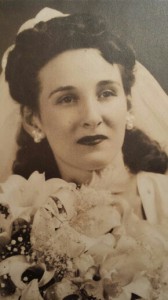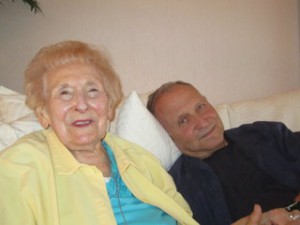Where to begin? Twenty-three hours ago I held my mother’s arm as she died. She was 89 and I had lived with the probability of her death for years. She had a bad heart and whenever the phone rang and I saw it was from her caregiver, I thought it would be THAT call. Your poor mother is gone. But it didn’t happen that way. My mother, to our horror, was not succumbing to a heart problem, but, over the last four months, was showing signs of progressive dementia. Why horror? Because she had an incredible mind and through 88 years had not lost any mental capacity. We assumed her heart would take her, and never really prepared ourselves for this.
On Sunday my brother heard from the caregiver, a saint appropriately named Joan, that my mother was unresponsive mentally, and she feared she was failing. This was not the first time we had rushed down to Florida to be with her for a crisis; however, this time we were planning to meet up there anyway this week, spend time with my mother and each other. We live in different regions, he in North Carolina and me in New York. We knew she was fading. For all of her years a short phone conversation with her was 45 minutes; now she couldn’t stay focused for five.
and she feared she was failing. This was not the first time we had rushed down to Florida to be with her for a crisis; however, this time we were planning to meet up there anyway this week, spend time with my mother and each other. We live in different regions, he in North Carolina and me in New York. We knew she was fading. For all of her years a short phone conversation with her was 45 minutes; now she couldn’t stay focused for five.
I was booked for a Tuesday morning flight, but went Monday morning instead. During the flight I stayed calm by convincing myself that this trip would be uneventful. My mother had remarkable resilience her entire life. She bounced back many a time. This would be the same. As soon as the plane touched down up popped a text message from my brother saying Joan had taken my mom to the ER thinking her respiration was weak. I was standing in the aisle waiting for the cabin door to open and just wanted to melt into the floor. The person in front of me moved so slowly I wanted to climb over her. Getting angry is one of the ways I deal with grief. I get really mad at the person blocking my way or the tech who draws blood, or the hospital administrator. I don’t understand the expression ‘tears of rage.’ to me, rage forces down tears.
I broke down completely in the car on US 95 South at eighty miles an hour. I pulled over and called my wife. She grounded me, and I felt again that my mother would bounce back. She was a child of the depression. She lived in Brooklyn, NY across from a modest catering hall. On weekends her mother would dress up her adorable little girl and send her across the street to mingle with the invited guests and eat as much as she could. When she was a teenager she came home from school to find her mother with her head in the gas oven. My grandmother was a tower of strength but tortured by severe depression. My mother fell in love with my father just as Japan bombed Pearl Harbor and the U.S. shipped him out on the next boat. It was always like this; whatever life threw at her she overcame it.
 She was a terrific mom. I always felt unconditionally loved and cherished. I cannot remember us ever having a serious fight. She loved my first wife as you would a daughter, and during her illness and subsequent death at forty-two, my mother was always at her side. When I married Wendy who had two young children, my mother became an instant grandmother and embraced the role with zeal and passion. They came to love her so deeply it brings tears to my eyes to even think about it.
She was a terrific mom. I always felt unconditionally loved and cherished. I cannot remember us ever having a serious fight. She loved my first wife as you would a daughter, and during her illness and subsequent death at forty-two, my mother was always at her side. When I married Wendy who had two young children, my mother became an instant grandmother and embraced the role with zeal and passion. They came to love her so deeply it brings tears to my eyes to even think about it.
When I arrived at the ER of Delray Hospital my mother looked like she was failing. Her eyes were closed, but she opened them when Joan told her I was there, and said “Hello Larry!” as I leaned in for a kiss. While we waited for my brother to arrive the hospital ran up the usual bill doing a CT scan, blood work,urinanysis, and a chest x-ray. Soon after my brother arrived, her primary physician showed up. Dr. Adel Mansour has taken outstanding care of my mother for the last four years. He is compassionate and skillful, precisely juggling her failing heart and failing liver and giving her the best quality of life possible. He told us she was failing, and that this was probably the end. He asked if she had stopped eating, and we told him that no, her appetite was strong. He told us that when she stopped taking food the end would be near. He offered us in-hospital or home hospice care, and we elected the latter. My mother hated hospitals and was clear that she wanted to die at home. The front door and the kitchen were festooned with DNR paperwork. We honored her wishes and brought her home Monday night.
I slept fitfully that night expecting that any minute the phone would ring with bad news, but since she was still hungry, I was coming around to believing that I would be flying back to New York until I got the call that she had stopped eating. Tuesday was a wonderful day for her. She was mostly out of it, but roused herself to eat, and to tell each of us she loved us. She and Joan somehow managed to sing a song together. My son called and I held the phone to her ear while she listened intently. One of her first cousins called, and she listened again. When my daughter called, my mother held my wrist tightly to keep the phone pressed to her ear consumed with every word my daughter spoke. I was surprised at the strength of her grip.
Soon after that Joan fed her again. My brother, his significant other, Susan, and I were in the room. Wendy, my wife, called, and asked how things were. I was just telling her that I would come home on Thursday when my mother began choking. Joan and Susan cleared her airway, and she could breathe, but she died anyway. Perhaps her heart gave out. I cry now reliving this. I was devastated. Despite months, no years, of wanting a painless, easy death for her, I did not want her to leave me. I was at that moment overcome with grief. I never imagined a world without her. Joan and Susan and I moved her from her recliner chair to the bed, and I asked that they leave me with her, and I lay down next to her holding her, my body wracked with sobs. My brother came in and we held each other.
Then we had to deal with three hours of process, the downside of a death at home. The EMTs came first, wanting to see one single piece of paper that in this moment chose to go missing. Finally, after examining her they told me I could stop looking and went from official mode to gentle kindness. Since the hospice nurse was not there, the sheriff came. He was gentle from the start, explaining everything to me, and called in the hospice people to speed their arrival. The hospice nurse did her part, then the funeral home people showed up. I had never done this. My first wife and my dad died in hospitals.
I am still consumed with an intensity of the pain I had not expected. When My first wife died she was in the hospital for nine weeks and when the end came, it was also gradual, her blood pressure dropping over an eight hour period until she was gone. It was a very different experience of grief.
Continue reading……


Larry I am so sorry to hear about your mother passing. I went through the death of my mom years ago and even though it was expected I wasn’t ready and I don’t think there is a way to be ready. It helps to have family and friends near and I hope they are close by now. Writing and sharing helps. I’m here if you need anything.
George
I am 10 months out from losing my amazing 59-year-old mom and it is almost too much to bear at times. I’m so sorry for your loss.